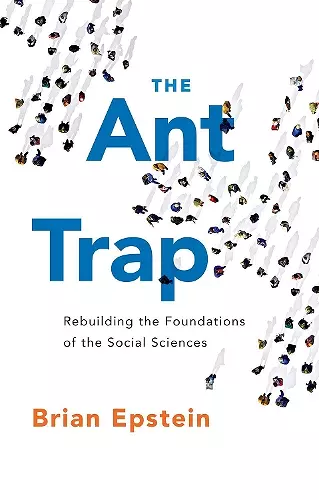The Ant Trap
Rebuilding the Foundations of the Social Sciences
Format:Paperback
Publisher:Oxford University Press Inc
Published:27th Sep '18
Currently unavailable, and unfortunately no date known when it will be back
This paperback is available in another edition too:
- Hardback£55.00was £55.00(9780199381104)

Winner of the 2016 American Philosophical Association Joseph B. Gittler Award Winner of the 2016 Lakatos Award
In The Ant Trap, Brian Epstein rewrites our understanding of the nature of the social world and the foundations of the social sciences. He develops a new model of the social world, and shows that the actions and intentions of social groups often depend on more than their members.We live in a world of crowds and corporations, artworks and artifacts, legislatures and languages, money and markets. These are all social objects - they are made, at least in part, by people and by communities. But what exactly are these things? How are they made, and what is the role of people in making them? In The Ant Trap, Brian Epstein rewrites our understanding of the nature of the social world and the foundations of the social sciences. Epstein explains and challenges the three prevailing traditions about how the social world is made. One tradition takes the social world to be built out of people, much as traffic is built out of cars. A second tradition also takes people to be the building blocks of the social world, but focuses on thoughts and attitudes we have toward one another. And a third tradition takes the social world to be a collective projection onto the physical world. Epstein shows that these share critical flaws. Most fundamentally, all three traditions overestimate the role of people in building the social world: they are overly anthropocentric. Epstein starts from scratch, bringing the resources of contemporary metaphysics to bear. In the place of traditional theories, he introduces a model based on a new distinction between the grounds and the anchors of social facts. Epstein illustrates the model with a study of the nature of law, and shows how to interpret the prevailing traditions about the social world. Then he turns to social groups, and to what it means for a group to take an action or have an intention. Contrary to the overwhelming consensus, these often depend on more than the actions and intentions of group members.
More important, however, is Epstein's account of the social world in terms of "grounding," "framing," and "anchoring"; it seems to offer hope of providing a better, more useful understanding of the social world. This is an important book; the author is well versed in recent literature, careful, and clear... Recommended. * Choice *
The Ant Trap is a powerful book that challenges individualist assumptions that have guided social theory and philosophy of social science over the past several decades. It also shows why good metaphysics matters. It is a must-read both for those working in the foundations of social science, and for anyone in philosophy interested, quite broadly, in ontology and explanation. The book demonstrates clearly how interdisciplinary philosophical work can inform, and transform, inquiry in several fields, including philosophy itself." - Sally Haslanger, Ford Professor of Philosophy, Massachusetts Institute of Technology
This book is one of the most thought-provoking contributions to the philosophy of social science I have read in years. To make progress in the social sciences, Brian Epstein argues, we need to clear up some metaphysical confusions about the nature of social objects, properties, and facts. Epstein proposes a new model of social reality, based on the distinction between 'grounding' and 'anchoring', which illuminates the relationship between social and non-social features of the world. Beautifully written and packed with insights, this book is an essential read for anyone interested in the foundations of the social sciences." - Christian List, Professor of Political Science and Philosophy, London School of Economics, and Fellow of the British Academy
For anyone interested in social ontology, The Ant Trap should be the very next book you read. It not only fashions sharper tools for the analysis of social phenomena, it provides a new perspective on the debates in social ontology, and shines a bright and not very flattering light on the current consensus. It does what the best philosophical works can do: It improves the questions we are asking. * Metascience *
Brian Epstein has produced an ambitious, innovative approach to the analytical explanation of social facts and entities, including small and large social groups, collective actions, public artifacts, organizations, etc. Throughout, he urges a deep openness to unexplored methodological and ontological possibilities not exemplified in current social science practice or theory and systematically demonstrates how new analytical tools address what he sees as lacunae or confusions in current theory. * Philosophy in Review *
- Winner of Winner of the 2016 American Philosophical Association Joseph B. Gittler Award Winner of the 2016 Lakatos Award.
ISBN: 9780190871758
Dimensions: 231mm x 155mm x 20mm
Weight: 499g
312 pages